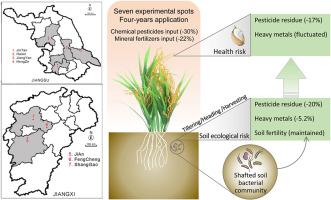减少水稻种植中农药投入以提高农业生态系统恢复力和食品安全的技术策略调查与见解,以中国为例
IF 8.4
2区 环境科学与生态学
Q1 ENVIRONMENTAL SCIENCES
引用次数: 0
摘要
对谷物生产日益增长的需求导致了农用化学品投入的增加;因此,需要评价和调整现行做法,以维持和改进可持续的种植制度。在中国南方开展了一项为期4年的水稻减量施用农用化学品的研究,以评估其对食品安全和生态恢复力的影响。农药总使用量减少30%,导致蚯蚓的生态风险减少20%,这主要是由于减少了主要农药的使用:吡蚜酮、甲酰氯、二苯丙康唑、丙环康唑、硫氟酰胺、三环唑和六硝唑。总矿物肥料使用量减少22%对土壤肥力有轻微影响;然而,用有机肥部分替代化肥的某些做法提高了土壤酶活性。这种改善也与土壤细菌群落的变化有关,特别是双胞菌、放线菌和蓝藻的富集,这有助于提高土壤肥力。此外,农药用量的减少伴随着重金属积累的下降趋势;然而,砷和镉的暴露风险仍然需要考虑。我们的研究表明,逐步减少农用化学品投入可以减轻污染风险,重新激活土壤自我修复过程,从而能够设计适应性强的可持续种植系统,优化生态权衡。本文章由计算机程序翻译,如有差异,请以英文原文为准。

Investigation and insights into the technical strategies for reducing agrochemical inputs in rice farming to enhance agroecosystem resilience and food safety, A case study in China
The growing demand for cereal production has led to increasing agrochemical inputs; therefore, evaluation and adjustment of current practices are required to maintain and improve sustainable cropping systems. A Four-years study of multiple practices with reduced agrochemical application for rice farming was conducted and investigated in southern China to assess impacts on food safety and ecological resilience. A 30 % reduction in total pesticide use resulted in a 20 % decrease in ecological risk to earthworms, primarily due to reduced application of key pesticides: pymetrozine, pretilachlor, difenoconazole, propiconazole, thifluzamide, tricyclazole, and hexaconazole. A 22 % reduction in total mineral fertilizer use had a slight impact on soil fertility; however, certain practices involving partial replacement of chemical fertilizers with organic manure enhanced soil enzyme activity. This improvement was also linked to changes in the soil bacterial community, particularly the enrichment of Gemmatimonadetes, Actinobacteria, and Cyanobacteria, which contributed to enhanced soil fertility. Additionally, reduction in agrochemical application was accompanied by a declining trend in heavy metal accumulation; however, exposure risks of arsenic and Cd still require consideration. Our study demonstrates that progressive reduction of agrochemical inputs can mitigate pollutant risks and reactivate soil self-restoration processes, thereby enabling the design of adaptable sustainable cropping systems with optimized ecological trade-offs.
求助全文
通过发布文献求助,成功后即可免费获取论文全文。
去求助
来源期刊

Journal of Environmental Management
环境科学-环境科学
CiteScore
13.70
自引率
5.70%
发文量
2477
审稿时长
84 days
期刊介绍:
The Journal of Environmental Management is a journal for the publication of peer reviewed, original research for all aspects of management and the managed use of the environment, both natural and man-made.Critical review articles are also welcome; submission of these is strongly encouraged.
 求助内容:
求助内容: 应助结果提醒方式:
应助结果提醒方式:


